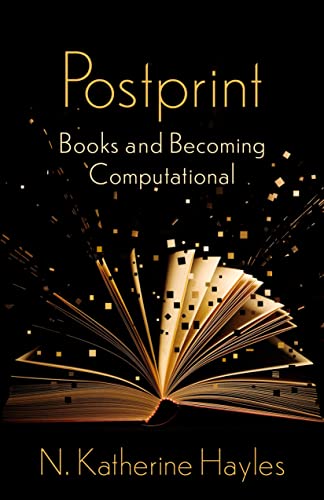Postprint
Books and Becoming Computational (The Wellek Library Lectures)
N. Katherine Hayles
BOOK REVIEW

In an age where the digital revolution challenges our understanding of literature and narrative, Postprint: Books and Becoming Computational emerges as a vital discourse that demands your immediate attention. N. Katherine Hayles, a distinguished figure in the intersections of literature, technology, and cognitive theory, artfully navigates this evolving landscape, forcing us to confront the fundamental questions about what it means to read and write in a world increasingly influenced by computational processes.
This work is not merely an academic text; it's a clarion call to rediscover the nature of books and the reader's role in a digital era. Hayles dives deep, dissecting how literature transforms when intermixed with algorithms, data, and multimedia narratives. As you delve into her thoughts, you are compelled to rethink the very essence of storytelling. Are we mere consumers of texts, or are we becoming co-creators in a rich tapestry woven with the threads of technology?
Hayles' exposition evokes a sense of urgency. With each page, she guides you through a labyrinth of ideas where every twist and turn challenges conventional perceptions. The author argues that the traditional boundaries of literature are dissolving, paving the way for hybrid forms that merge the analytical with the creative. This exploration is not just theoretical; it speaks directly to a world where novels interface with apps, blogs with social media, and storytelling transcends the confines of paper and ink.
The structure of Hayles' narrative is as compelling as her arguments. Employing a blend of theoretical framework and empirical analysis, she invites you into a dialogue- a conversation that spans centuries yet feels intimately timely. You may find yourself reflecting on your reading practices, questioning whether a Google search can ever replace the tactile pleasure of a printed book. Or consider how e-readers and digital platforms redefined your engagement with texts.
Critics have lauded Postprint, but not without contention. Some argue that her theories lean too far into the abstract, potentially alienating those tethered to traditional literary criticism. Yet, this very critique lays bare the necessity of her exploration. The discomfort felt by some in confronting the porous boundaries of literature mirrors general anxieties toward technology's grip on our lives. Hayles challenges you to embrace this disquiet and dig deeper into the implications of becoming computational.
Readers have expressed a range of emotions about the text- from awe at Hayles' bold vision to a struggle against the cognitive dissonance her ideas invoke. One might feel a visceral anger at the thought of a digital realm overshadowing the revered dominion of print, while others revel in the idea of evolving genres that blur the lines of creativity. This dichotomy encapsulates the broader cultural conversation we must engage in today, making Postprint a pivotal resource for both scholars and casual readers.
As you journey through its illustrated pages, it becomes evident: Postprint is a provocative exploration that offers no easy answers but insists upon the necessity of dialogue in our shifting comprehension of books. To remain stagnant is not an option; to be an active participant in this evolution is crucial. Wake up to the revelations within Hayles' work. Your understanding of literature-and perhaps reality itself-may never be the same.
📖 Postprint: Books and Becoming Computational (The Wellek Library Lectures)
✍ by N. Katherine Hayles
🧾 248 pages
2021
#postprint #books #becoming #computational #the #wellek #library #lectures #katherine #hayles #NKatherineHayles